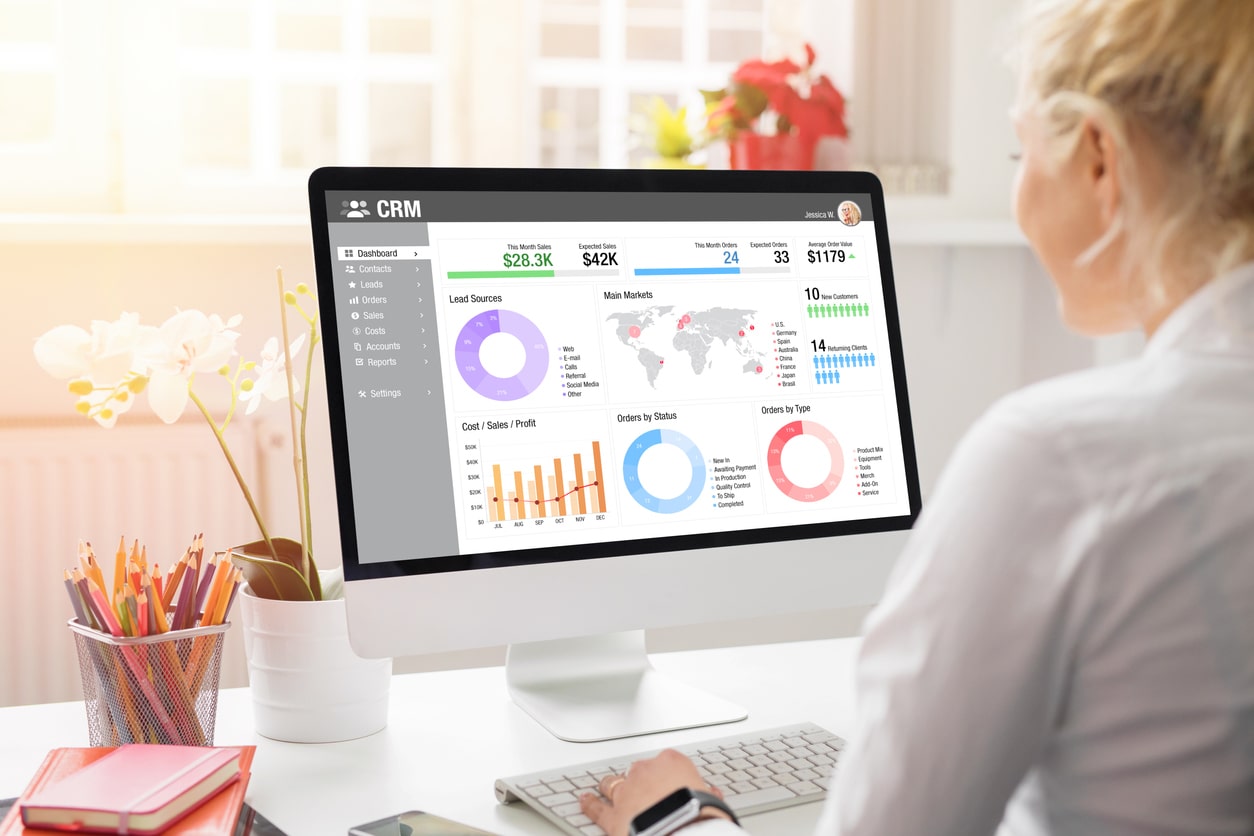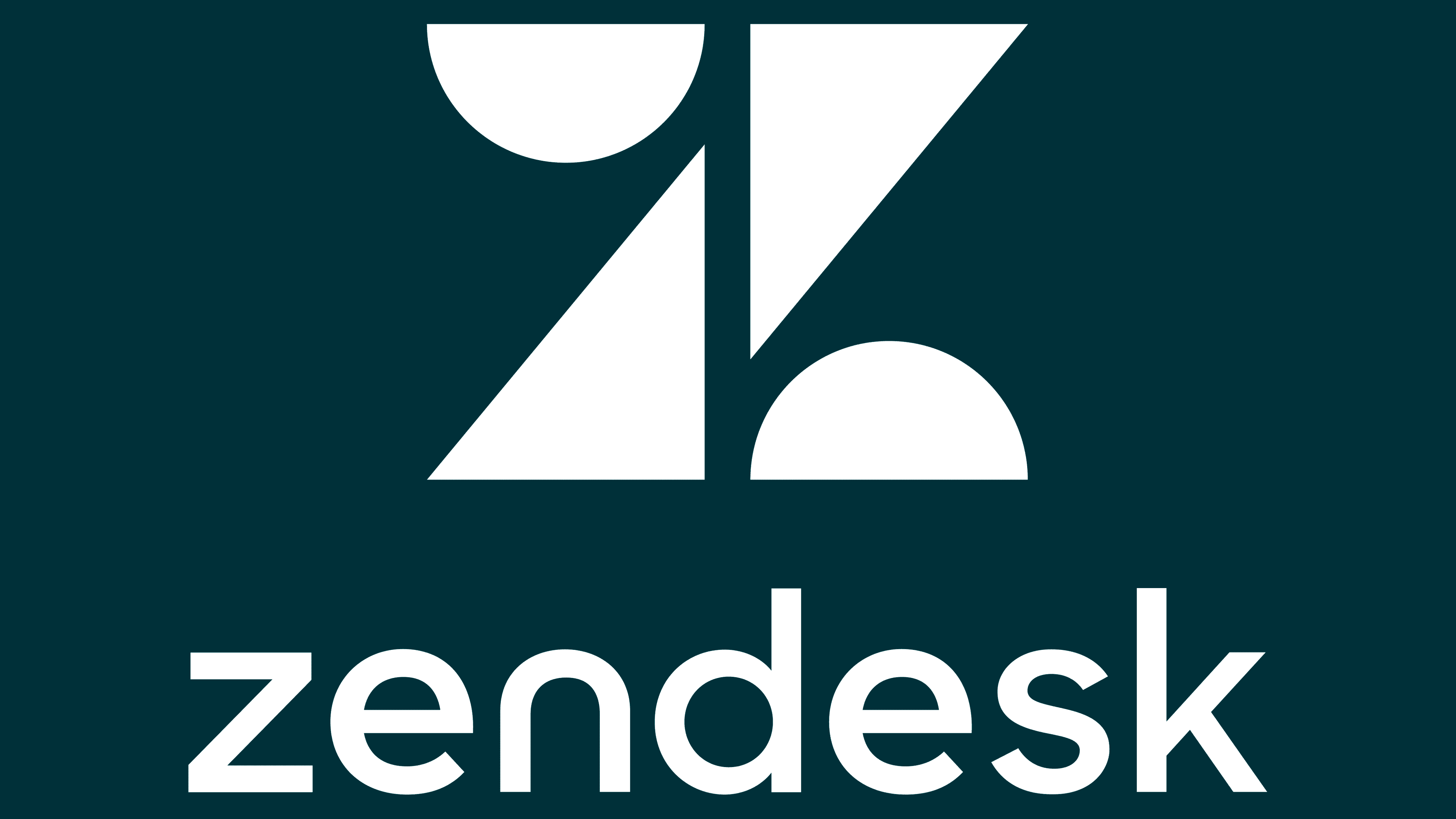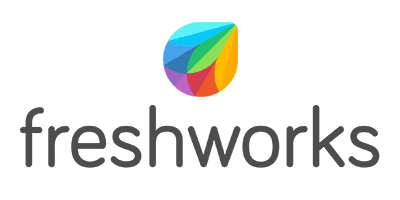As a small business owner, keeping track of your sales pipeline is of utmost importance. You will need a quality sales CRM software to efficiently manage your sales process and customer relationships, and ultimately grow revenue.
A sales CRM offers data-driven insights and reporting, as well as ways to refine your existing sales strategies. It also empowers businesses to nurture leads, improve conversion rates and maximize customer satisfaction.
QuickLook: 6 Best Sales CRM Software
There are several sales CRM on the market to choose from. We’ll take a look at six of the best software, along with their key features, price points, pros, and cons.
What Is a Sales CRM?
A sales CRM (Customer Relationship Management system) is software designed to help businesses manage and optimize their sales processes and interactions with customers and leads. It serves as a centralized hub for storing, organizing, and analyzing customer data, sales activities, and communication histories.
Sales CRMs aim to enhance sales efficiency, improve customer relationships, and enable data-driven decision-making. They are used by sales teams of all sizes to streamline workflows, nurture leads, and, eventually, close deals.
How Does a Sales CRM Benefit Your Business?
There are several advantages to utilizing a sales CRM for your business, such as contact management and keeping a log of all your communications.
A sales CRM allows you to generate insights and reports on sales performance, conversion rates, and other key metrics for your business.
It also makes automation easier, allowing you or your coworkers to automate repetitive tasks, such as sending follow-up emails or assigning leads to sales representatives, and even integrating with other tools and platforms, like email, marketing, and e-commerce funnels.
Salesforce
AI + Data + CRM = more sales and happier customers.
Start or grow your business with the #1 CRM. Salesforce now has AI tools that helps you connect with your customers in a whole new way.
Salesforce CRM offers a comprehensive suite of tools for managing customer data, sales pipelines, marketing campaigns, and customer support tickets. With its user-friendly interface and scalability, Salesforce CRM empowers businesses to enhance customer relationships, improve sales efficiency, and drive growth by centralizing crucial customer-related information and facilitating collaboration across teams.
Key features of Salesforce CRM include:
- Contact and Lead Management: Salesforce allows businesses to efficiently manage their contacts, leads, and accounts in a centralized database. This feature facilitates targeted marketing efforts and personalized customer engagement.
- Sales Automation: Salesforce CRM offers robust tools for automating sales processes, such as lead routing, opportunity tracking, and forecasting. It helps sales teams manage their pipelines, track deals, and prioritize tasks.
- Customizable Dashboards and Reporting: The platform provides users with the ability to create customizable dashboards and reports, enabling real-time visualization of key performance metrics.
Pricing: Salesforce CRM has a per-month price range from as low as $25 per user to as high as $300 per user.
Pros:
- Comprehensive Features: Salesforce offers a wide range of tools for sales, marketing, and customer service, all integrated into a single platform. This facilitates seamless collaboration and data sharing across teams.
- Scalability and Customization: The platform is highly customizable and can be tailored to match the unique processes and workflows of different businesses. It also scales well as your business grows.
- Cloud-Based and Mobile-Friendly: Salesforce allows access to information from anywhere with an internet connection. Its mobile app enables users to stay productive on the go, enhancing flexibility and responsiveness.
Cons
- Complexity: Due to its extensive features, Salesforce can be overwhelming for new users, leading to a steep learning curve. Training and support might be necessary.
- Cost: The software’s pricing can be relatively high, particularly for businesses with larger teams or those needing advanced features. The initial investment, along with potential add-on costs, might be a concern for smaller businesses.
- Integration Challenges: While Salesforce offers integration options, connecting with other software systems might require technical expertise or additional third-party tools.
Hubspot
Grow better with HubSpot
Software that's powerful, not overpowering. Seamlessly connect your data, teams, and customers on one CRM platform that grows with your business.
HubSpot is a user-friendly and powerful CRM platform with a focus on streamlining communication and enhancing customer relationships. It provides robust features for efficient contact management, marketing automation, and in-depth reporting and analytics.
Key features of Hubspot CRM include:
- Contact and Lead Management: HubSpot CRM provides a centralized database for managing contacts and leads. It tracks interactions, communication history, and engagement with potential and existing customers, allowing for personalized communication and targeted marketing efforts.
- Email Tracking and Automation: The software offers email tracking capabilities that notify users when emails are opened or clicked. It also includes email automation tools for creating and scheduling automated email sequences.
- Sales Pipeline Management: HubSpot CRM helps users visualize and manage their sales pipelines. It allows for easy tracking of deals, stages, and progress, helping sales teams prioritize and close deals efficiently.
Pricing:
Hubspot CRM has a price range from as low as $50 per month to as high as $2,400 per month. Hubspot also offers a free service, although that comes with very limited features.
Pros:
- User-Friendly Interface: HubSpot CRM boasts an intuitive and user-friendly interface, making it easy for teams to navigate, adopt, and utilize the platform effectively.
- Integration and Ecosystem: It offers seamless integration with other HubSpot tools, creating a comprehensive marketing, sales, and customer service ecosystem for businesses to manage their entire customer lifecycle.
- Free Basic Version: HubSpot CRM’s free version provides features for small businesses to manage contacts, leads, and deals without incurring initial costs.
Cons:
- Limited Advanced Functionality: The free version lacks advanced features that might be essential for larger or more complex businesses, potentially necessitating an upgrade to a paid plan.
- Scaling Costs: While the starter plan is reasonably priced, higher-tier plans can become costly as additional features and users are added, making it less affordable.
- Learning Curve: Some advanced features might have a learning curve, especially for users who are new to marketing automation and CRM software.
Zendesk
Unlock the power of customer experiences
Build lasting relationships with our complete customer service solution.
With its user-friendly interface and scalability, Zendesk CRM helps businesses build strong customer relationships, improve response times, and deliver exceptional support experiences.
Key features of Zendesk CRM include:
- Ticketing Support: Zendesk CRM offers robust ticketing capabilities, enabling businesses to manage customer inquiries and issues across various communication channels, like email, chat, social media, and phone, in a unified dashboard.
- Automation and Workflows: The software streamlines support processes through automation, allowing for efficient routing of tickets, predefined responses, and task assignments. This enhances response times.
- Knowledge Base and Self-Service: Zendesk provides tools to create and maintain knowledge bases and community forums. Customers can find solutions independently, reducing support load while empowering users to resolve their issues.
Pricing:
Zendesk’s basic monthly pricing plans start at $19 per user and go up to $219 per user.
Pros:
- Omnichannel Support: Zendesk offers seamless management of customer interactions across multiple communication channels, improving response consistency and customer satisfaction.
- Customizable Workflows: The software’s automation and customization options allow businesses to design support workflows tailored to their processes, enhancing efficiency and productivity.
- Self-Service Tools: Zendesk’s knowledge base and community forums empower customers to find solutions independently, reducing support volume and fostering a self-sufficient user base.
Cons:
- Cost Accumulation: Advanced features and add-ons can significantly increase costs, making it less suitable for small budgets.
- Learning Curve: The software’s extensive features might require a learning curve for new users, particularly those unfamiliar with customer service software.
- Integration Complexities: While Zendesk integrates with various tools, complex integrations might require technical expertise or additional resources, potentially posing challenges for some businesses.
Freshsales
Freshsales is a powerful CRM system with AI-powered features, email tracking, and built-in phone capabilities, designed to empower sales teams. The software can be utilized effectively by organizations to manage customer relationships and conduct successful marketing campaigns.
Key features of Freshsales CRM include:
- Prioritize and engage with potential customers based on their likelihood to convert.
- Monitor customer interactions with email tracking and schedule personalized follow-ups, ensuring better communication and nurturing leads.
- Analyze sales data and measure campaign performance, enabling data-driven decisions to improve your marketing strategies.
- Freshsales offers accessibility on both mobile devices and desktop computers.
Pricing:
Freshsales offers various pricing plans from as low as $15 to $35 per user per month. There are additional plans available to suit larger enterprises.
Pros:
- Intuitive Interface: Freshsales offers a user-friendly interface that makes it easy for teams to quickly adopt and navigate the CRM software.
- Lead and Contact Management: The platform excels in lead and contact management, allowing businesses to organize, track, and nurture leads through customizable pipelines and automated workflows.
- Email Tracking and Engagement: Freshsales provides email tracking and engagement insights, enabling users to monitor interactions and gauge the effectiveness of their email campaigns.
Cons:
- Limited Customization: Freshsales might lack the deep customization options offered by more advanced CRM systems, potentially limiting adaptation to unique workflows.
- Complex Pricing Tiers: Some users find Freshsales’ pricing structure confusing, as certain features are available only in higher-tier plans, potentially making it challenging to select the right plan.
- Learning Curve for Advanced Features: Utilizing advanced features might require time and training, especially for users who are new to CRM software.
Pipedrive
The CRM platform to grow your business
The first CRM designed by salespeople, for salespeople. Do more to grow your business.
Pipedrive is a highly-effective sales-focused CRM designed to empower small and medium-sized businesses in managing their sales pipelines with efficiency.
Key features of Pipedrive’s CRM include:
- Pipeline Management: Pipedrive specializes in visual sales pipeline management, allowing users to track deals through different stages. This visual approach helps sales teams focus on the most promising opportunities and prioritize actions effectively.
- Activity Tracking: The software offers tools to schedule and track activities, such as calls, emails, and meetings. It also supports automation, enabling users to streamline repetitive tasks and ensure timely follow-ups.
- Customization and Integration: Pipedrive provides customizable fields and workflows, allowing businesses to tailor the CRM to match their specific sales processes. The software also integrates with various third-party apps and services, enhancing its functionality and adapting to existing workflows.
Pricing:
Pipedrive offers various pricing plans, starting as low as $14.90 per user per month for a basic package, and go up to $49.90 per user per month for an advanced package.
Pros:
- Visual Pipeline: Pipedrive’s visual sales pipeline offers a clear overview of deals, helping sales teams prioritize and progress opportunities effectively.
- User-Friendly: The software’s intuitive interface and straightforward design make it easy for users to navigate and adopt quickly, minimizing the learning curve.
Cons:
- Limited Marketing Features: Pipedrive focuses primarily on sales, lacking some advanced marketing automation and campaign management features.
- Reporting Complexity: While Pipedrive provides reporting tools, some users find its reporting capabilities less extensive or more complex than other CRM systems.
- Less Comprehensive for Large Enterprises: While suitable for many businesses, Pipedrive might lack some of the scalability and advanced features needed by larger enterprises with complex sales processes.
Zoho CRM
Bring the very best out of your customer-facing teams with robust automation, comprehensive analytics, personalized solutions, and more. Sign up and get started in no time—the fastest implementation in the enterprise CRM market.
Zoho CRM is a user-friendly solution that offers automation features, analytics, and seamless integrations with other Zoho products. It is a good option for businesses that need a comprehensive CRM solution at a reasonable price.
Key features of Zoho CRM include:
- Contact and Lead Management: Zoho CRM offers tools to effectively manage and organize customer contacts and leads. This includes tracking interactions and communication history.
- Sales Automation: The software provides automation capabilities to streamline repetitive tasks and processes, such as lead assignments, follow-up reminders, and email campaigns.
- Analytics and Reporting: Zoho CRM offers reporting and analytics features that provide insights into sales performance, lead conversion rates, and other key metrics.
Pricing:
Free plan for up to three users, which is suitable for smaller teams or businesses with basic CRM needs. Paid plans start at $12 per user per month and range up to $249 per month, offering advanced features and scalability for growing businesses.
Pros:
- Affordable Options: Zoho CRM offers a range of pricing plans, including a free version, making it accessible to businesses with varying budgets.
- Integration Ecosystem: Zoho provides a suite of business tools that can be integrated seamlessly, allowing for a comprehensive ecosystem to manage various aspects of your business operations.
Cons:
- Complexity for Advanced Features: Some advanced features might have a steeper learning curve, particularly for users new to CRM or more complex functionalities.
- Scalability Limitations: While suitable for small to medium-sized businesses, Zoho CRM might have limitations in terms of scalability and advanced features needed by larger enterprises or complex sales operations.
What Features to Consider When Choosing a Sales CRM?
There are several reasons to choose a top-quality sales CRM while keeping in mind the return on investment it brings your business. Thus, look for the following features when selecting a sales CRM for your business:
- Integration capabilities ensure smooth data flow across tools
- Customization options adapt to unique workflows
- Mobile accessibility offers flexibility
- Lead management optimizes prospect handling
- Sales pipeline management tracks deals efficiently
- Reporting and analytics provide actionable insights
- Collaboration features enhance teamwork
- User-friendly interface boosts adoption
- Scalability accommodates growth
- Reliable customer support aids in seamless usage
Choosing the Best Sales CRM For Your Small Business
This article provides a comprehensive overview of popular sales CRM software options, highlighting their key features, pros, cons, and pricing details. Each CRM is assessed based on its ability to streamline sales processes, enhance customer relationships, and provide valuable insights. Ultimately, the analysis equips businesses with the information necessary to make an informed decision that aligns with their unique needs and objectives.
FAQs
How secure is your data in a sales CRM?
Most reputable CRM software providers take multiple measures to ensure data security. It’s also essential for businesses to educate their employees about data security best practices, like using strong passwords and avoiding sharing credentials. Before choosing a CRM software, it’s wise to research the security features offered by the provider and inquire about their security certifications and practices.
How does a sales CRM help improve customer relationships?
A sales CRM improves customer relationships by centralizing customer data, interactions, and communication history, enabling personalized engagement. It facilitates timely follow-ups and reminders, leading to better customer responsiveness. With data-driven insights, sales teams can understand customer preferences and behaviors, enhancing communication relevance.
Is it possible to customize a sales CRM to fit your business requirements?
Yes, many sales CRM systems offer customization options to tailor the software to match specific business processes and workflows.
How much does a sales CRM cost?
The cost of a sales CRM can fit most small business budgets. The cheaper the package, chances are a lesser amount of features are available.
How long does it take to see results after implementing a sales CRM?
The time it takes to see results after implementing a sales CRM can vary. Small businesses might experience initial improvements within a few weeks to a few months. However, significant outcomes might become noticeable over several months to a year of consistent usage and optimization.











